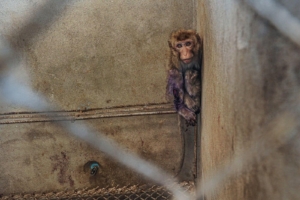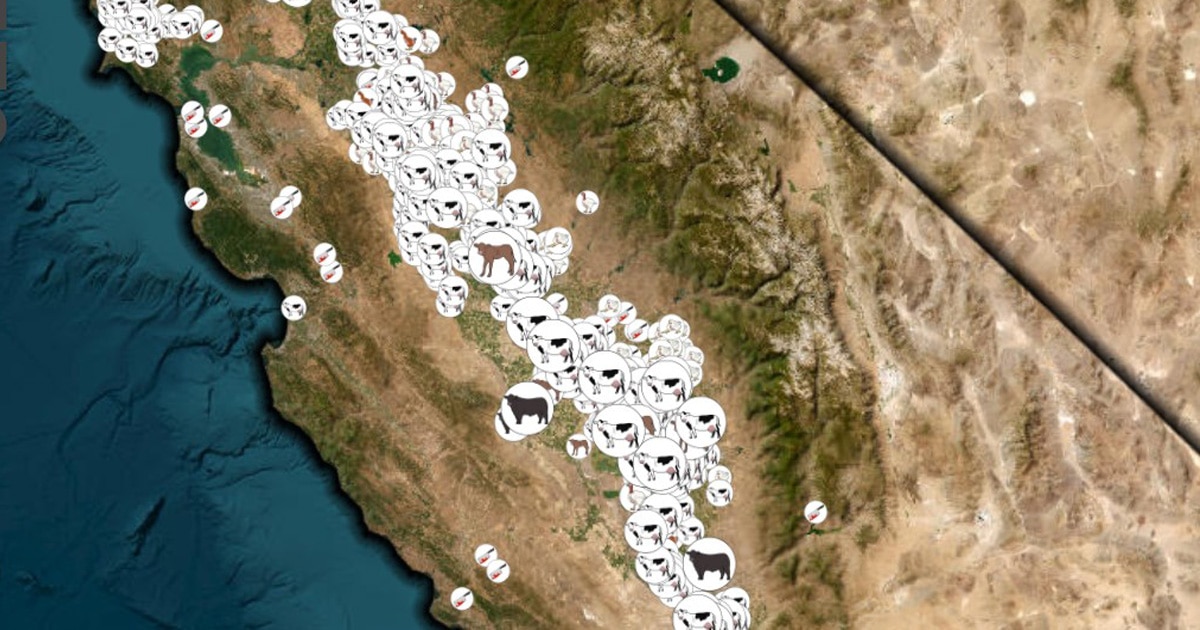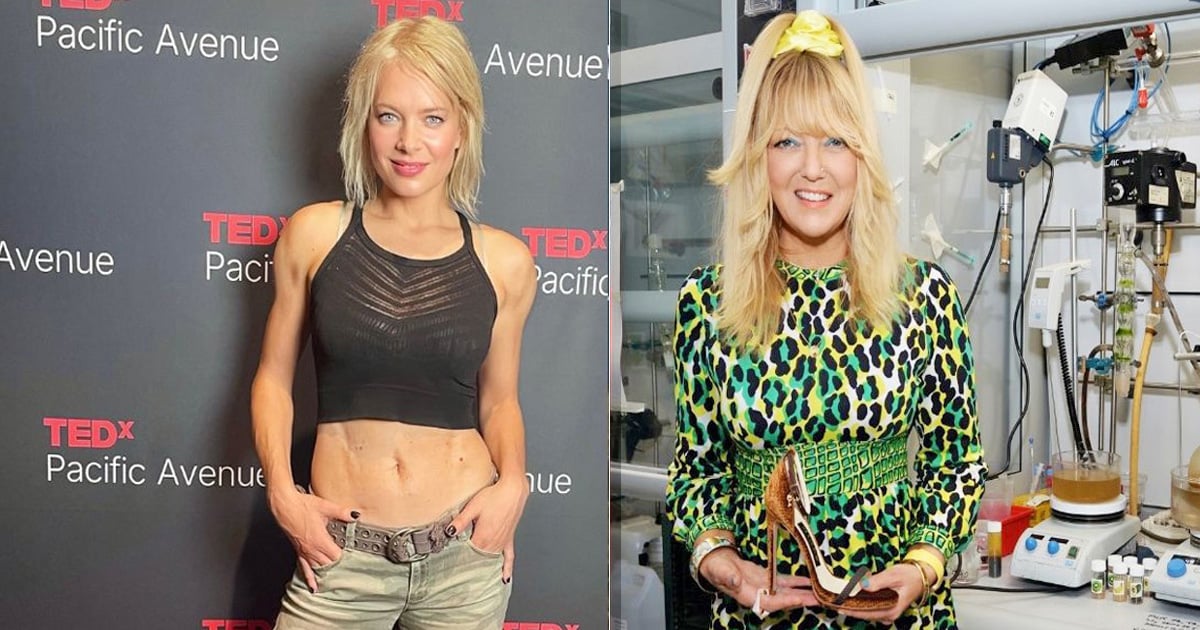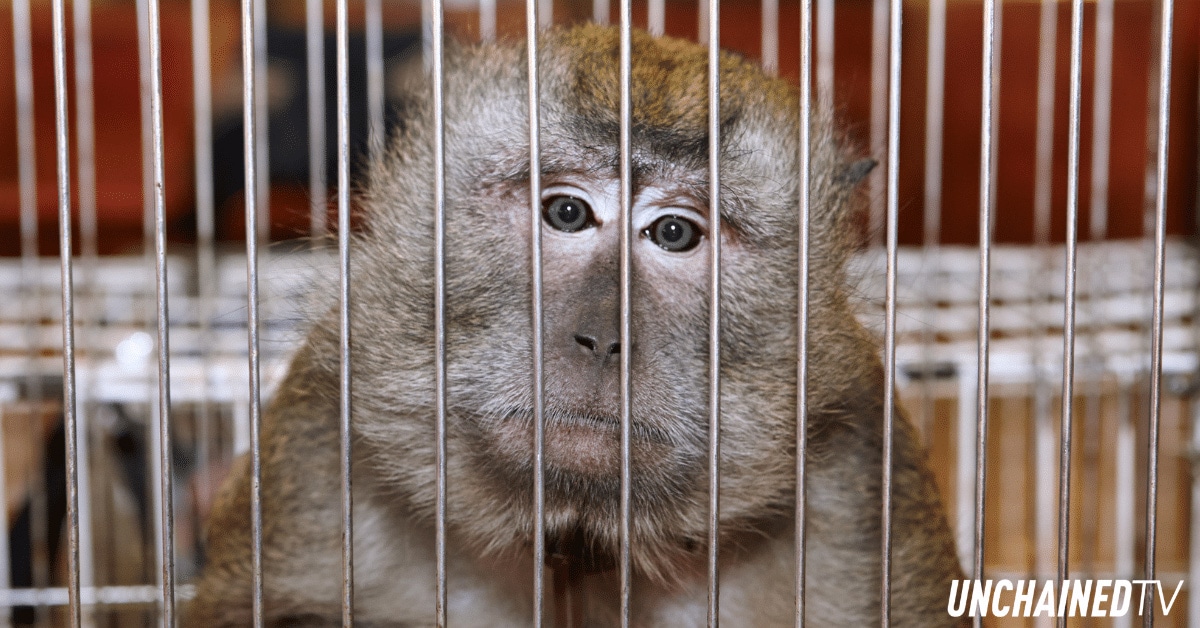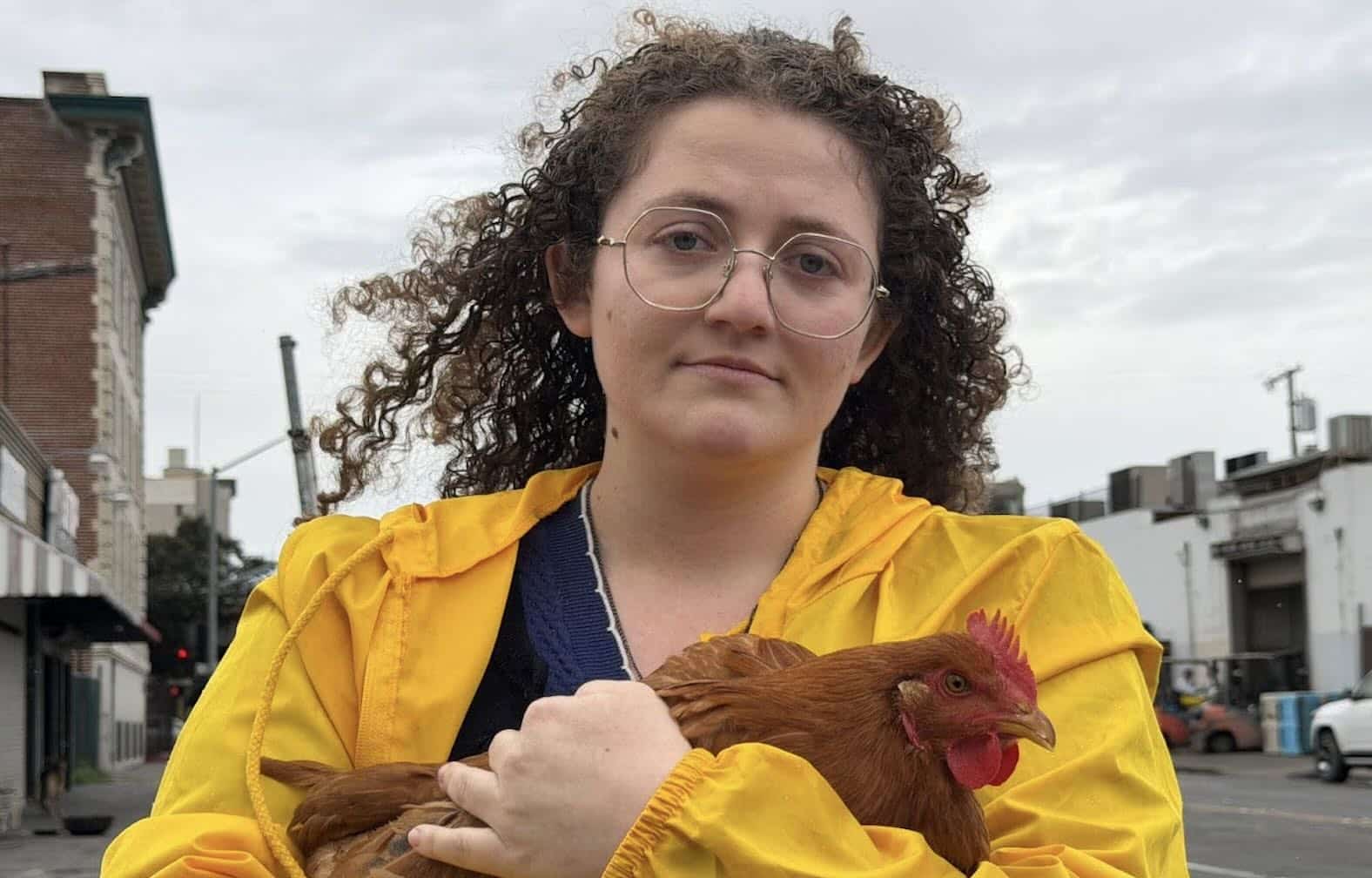[Speaker 2]
Live from the Unchained TV headquarters in Los Angeles, California, this is Truth Files with Jane Velez-Mitchell. Get in touch during the show on socials. And make sure you don’t miss any of Unchained TV’s award-winning programs by downloading the app for your phone, tablet, or smart TV.
And now with the headlines, it’s Jane Velez-Mitchell.
[Speaker 1]
Welcome. PETA and 76,000 of its followers are begging Attorney General Pam Bondi to send more than 1,200 monkeys to sanctuary. These monkeys are suffering terribly right now in some kind of legal limbo.
Here’s some video from We Animals that shows the type of animals we’re talking about. Long-tailed macaques. PETA is calling on Attorney General Pam Bondi to investigate alarming reports that the U.S. Department of the Interior and the Fish and Wildlife Service may deliver, hand over, more than 1,200 endangered long-tailed macaques to a controversial animal testing company. Even though they contend these animals were allegedly imported illegally. Look at this mother and her baby, how they are suffering behind bars. These sensitive, intelligent primates were allegedly torn from their forest homes, trafficked across continents, and are now trapped in heartbreaking limbo.
So I want to go straight out to Dr. Lisa Jones Engel, who is PETA’s senior science advisor. Tell us, what is the dilemma that monkeys like this are finding themselves in? And how can people who care about animals help Dr. Lisa Jones Engel?
Jane, thank you very much for having me on here today. So, yeah, you’re looking at them. So these are long-tailed macaques.
They’re an endangered species. They have been for decades the monkey of choice, particularly for the pharmaceutical industry. And these 1,269 animals, they came over, they were so young when they came over.
They were a year to maybe two years old. The first group were seized and placed in late 2022, another group in early 2023. They are stuck in the cages here in the U.S., not because they’ve done anything wrong, but because they are in, you’re right, they are in this limbo. They were trafficked. These animals came over on false documentation. They were falsely claimed to be captive-bred when, in fact, the company that brought them in, they couldn’t prove that they were not wild-caught.
And so these animals, rather than being returned to sanctuary or given sanctuary, which is the only place for them at this stage, they are very much in danger of being turned back over to the company, who is going to engage in essentially domestic re-laundering. They want to take these moms and these dads and breed them here in the U.S. and continue to use their babies for experimentation for who knows how long. And we cannot let that happen.
I want to say thank you to Wee Animals for providing this footage. We have also footage from PETA, and we also have footage from another organization. Honestly, just showing this video has traumatized me because it is just so awful.
I have to tell you that just uploading these videos is traumatizing. Imagine what it’s like to be one of these animals.
[Speaker 3]
Oh my God. Where is Nasu?
[Speaker 1]
Thank you to One Voice for that video. It’s gut-wrenching, as you can see. I’d like to bring in Amy Meyer, also with People for the Ethical Treatment of Animals, and you run the campaigns to try to save these animals.
What do they go through? For those who are saying, well, why should I take the time to reach out to Attorney General Pam Bondi and beg her to step in and help these monkeys, first tell us, what do these animals endure, Amy? Well, Jane, just as your video showed, the horror starts from the very beginning.
It starts in the forest, where some of these monkeys are being illegally captured from the wild, and it’s just horrific what happens to them. Babies are trapped with their mothers, and then the babies are pried away from their mothers, and they’re shoved into sacks. And then they are taken to, often, these monkey farms overseas, where sometimes what we have been finding, and what has been the case that the U.S. government had a case against this in Cambodia, that they are illegally labeled as if they were captive-bred and not taken from the wild, because it’s illegal to do that in Cambodia. And the horror only gets worse from there for these monkeys. They are put into these tiny wooden crates, like you’ve seen, and they’re put on an airplane. Sometimes they are in those crates for days, as they are shipped halfway around the world to end up at U.S. facilities. And eventually, they are taken to laboratories, where they, again, are shoved inside a metal cage, small metal cage, often completely alone. They will never again feel the sun on their backs. They will never again know what it’s like to climb into their sleeping tree with their large family, with their troop at night.
And they are only going to be forcefully force-fed chemicals or drugs, injected with things, and even worse, until they are killed. There is one way out of laboratories for these monkeys. But fortunately, we have an opportunity with these ones.
They have not been able to be used in experiments yet, and so that’s why we’re saying they have to go to sanctuary. That’s the only responsible and ethical thing to do with these monkeys who have been caught up in this illegal pipeline. And, you know, you have such an incredible support base, PETA does, that when you put something on your website, and the number keeps rising.
When I wrote the introduction, it was about 74. Now it’s over 76,000 people writing to the Interior Secretary, Secretary Burgum. And what is it that you are specifically asking for, Dr. Lisa?
So we’re asking our supporters, we’re asking everyone who sees these animals, who understands these are just like us, in the most important way. They love their infants, they love each other, they want comfort, they want companionship, they want to be able to choose. We are asking them to reach out to Secretary Burgum and say, these animals deserve to be released to sanctuary.
PETA and Born Free USA, we’ve been working on this now for two years. When we first found out about these animals, there’s only one place for them, and that is at sanctuary. These animals, they should be allowed to live for the remainder of their lives in decent conditions.
And you know what? The company that imported them, they’re the ones who need to be paying for their lifetime care. But first, the Department of the Interior needs to stand firm on this.
They cannot let this company, which illegally brought these animals in, who could never prove that they were not wild captured, turning these animals back to them and saying, here, do what you want, start a domestic breeding program. That makes an absolute mockery of the U.S. enforcement of our wildlife trafficking laws. That cannot be allowed to happen.
So what is it that Pam Bondi could do? And I think we all know anybody who watches the news, she’s been very caught up in a variety of controversies lately. But what could she do as the attorney general?
And, you know, I’d like to say, Pam Bondi, if you’re listening, and we used to have you on your show many years ago when I had a show on CNN Headline News, a crime show. I had you on several times to talk about crime stories that were involved in Florida back when you were a key official in Florida. One quick way for you to, I think, get some different headlines would be to take action on this.
And I think everybody who cares about animals, which is most Americans, would applaud you. What exactly are you asking Pam Bondi to do? To basically allow Fish and Wildlife and the Department of Justice to maintain the civil and criminal, and move forward the civil and criminal investigations and cases against the company that brought these monkeys in illegally.
You know, we’ve heard from multiple sources that the plan is to, like, you know what, quietly shut them down. Quietly close the cases down, turn the monkeys back over to Charles River, and just pretend none of this happened. Pam Bondi can make sure that doesn’t happen.
That actually these animals get the justice that they deserve. That the company that violated the Lacey Act, allegedly violated the Lacey Act, the Endangered Species Act, they are held accountable, they’re held responsible, and the animals actually get the justice that they deserve. And these poor animals, they have been kept in cages since they were transported out of their native country.
They’re just languishing in legal limbo. 1,200 long-tail macaques, and they are held by, correct me if I’m wrong, Charles River, the laboratory company that is one of the big experimenters and is involved in this industry. By the way, I did email them and ask them for comment.
I did not hear back by a deadline. We invite them on anytime. We would love to dialogue with you.
Where are these monkeys now? And it’s crazy to just try to wrap your head around this very complicated case. They are in legal limbo, essentially?
Right. So, thank you. Let me put a face on these monkeys for you.
1,269 of them. That’s a lot of monkeys. That’s a number of animals that have never been seized this magnitude of animals before.
And when they were seized in place, Fish and Wildlife was like, what do we do with them? And they allowed those animals to stay in the Charles River facility. Some of them were in Houston, Texas.
Others were up in Frederick, Maryland. And you’re right. They’re in metal cages.
Here’s the thing about a macaque. The most important thing to a macaque, the thing that makes them a macaque, makes them a monkey, is being with other animals. Being able to groom.
Being able to cuddle up with someone at night. To go up into the sleeping tree with the rest of your troop. And to be there next to your mom, your sisters, your aunties, your uncles.
That is the essence of a macaque. And in the laboratory, in this experimentation pipeline, they don’t get that. They get the exact opposite.
They get a metal cage with some monkey biscuits thrown in. They’re not seeing the daylight. They’re not seeing the sunshine.
They are. And you see it written on their bodies. We’ve not seen.
We’ve not had. There’s been no evidence of life of these 1,269. But if we were to see them, I can promise you, their hair will be coming out.
They will have injuries. Their faces will be pale. Their eyes will be sunken.
By the way, you’re looking at monkeys in the wild, engaged in natural habitat. This is what PETA has provided us. In their natural habitat, happily in a group.
Just proving your point that they love being in family settings. And they love being with their babies. And the babies, of course, want to be with the mothers.
There they are grooming themselves. This is how they should be living. And we rip them.
We, meaning humans, rip them from the wild and stick them in cages and torture them. To what end? When we know that we don’t have tails as humans.
We don’t have the same kind of snouts. And generally, almost always, Amy Meyer, the experiments that work on animals fail in humans. The drugs that work on monkeys fail in humans.
The procedures that work on monkeys fail in humans. Tell us why this is such a wildly inefficient waste of taxpayer money. Well, you’re absolutely right, Jane.
I mean, it is overwhelmingly when drugs and other treatments look safe and effective in animal models, 95% of the time when they go into humans, they’re failing. Either because they’re not working or sometimes they’re even dangerous. It’s clearly not a good way for us to understand and to get the treatments and cures that we all desperately want.
But there are more promising non-animal methods that are modern and really getting us the treatments and answers that we need a lot quicker. And fortunately, you know, right now the NIH is starting to prioritize those things more. They’re taking huge steps that we’ve never seen before to really prioritize these more modern human relevant non-animal methods.
And we need to be seeing more of this. And this is all the more reason that we need to be punishing people, punishing companies, illegally importing monkeys. And we need to be just flat out stopping importation of monkeys.
The NIH is the biggest funder of animal experiments. And they’ve made it clear that there’s a transition happening. And so we need to be leaving all of those monkeys in their natural homes and just instead be investing in these non-animal research methods.
And there, you know, I’m seeing your supporters already taking action on our page. I can’t wait to see how that number balloons after this. But there’s other ways on PETA.org to take more action for animals and laboratories. There’s a lot happening right now, a lot of good momentum for all animals and laboratories. And, you know, what I have to say is you’re absolutely right. I’ve been hearing a lot of reports lately of the NIH.
I watched an entire interview with the new head of the NIH, the National Institutes for Health, of Health, saying basically tell me more about non-animal testing methods. And that combined with the crackdown on wasteful government spending, and obviously that’s controversial, and I don’t want to get into partisan politics, but it’s a fact. There’s a cut on certain types of spending.
And so wouldn’t the first thing to go be these crazy unnecessary animal tests? That’s what I don’t understand. I mean, wouldn’t that be the absolute first thing to go, Dr. Lisa Jones-Engel?
Yes, it needs to be the absolute first thing to go. And you know what? Here’s the thing.
We stopped using chimpanzees a decade ago. Chimpanzees are our closest living relatives. We said the scientific community acknowledged it wasn’t working.
The macaques, these long-tailed macaques and the pig-tailed macaques and the rhesus macaques, you know what, they might be non-human primates, but we have not shared a common ancestor with them for 24 million years. A lot happens immunologically, physiologically. If it didn’t work with chimps, it’s not, and it has been proven repeatedly not to work with monkeys.
So we’re actually pretty excited. Again, you mentioned NIH is taking huge steps. They’re cutting off the source of money for animal studies.
What we need to now do is make sure that the actual source of monkeys coming into this country, that door is slammed shut. And that’s what we need Pam Bondi to do, shut that door and hold Charles River responsible for these animals who are sitting there suffering in ways that they never deserved. Here’s what I don’t understand.
So whereas there’s widespread cuts across the board, very controversial, whereas the National Institutes of Health is saying, hey, this is the 21st century. Let’s move away from animal models. This is a huge breakthrough.
Wherefore, why not stop what’s happening now and give these 1,200 monkeys to sanctuary, given that they’re scaling down the very test that these animals would be subjected to? Is this a case of lack of coordination amongst government agencies? Because I would think if the NIH, you know, got on the phone and said, hey, Interior Department, you know, we want these monkeys to go to sanctuary.
We’re not going to need them anymore. That that would be the end of the story. I don’t get there’s like a missing piece of the puzzle.
What’s going on? Let me help you with that. The missing piece is that these long tail macaques, the ones that we’re importing, most of them go to the pharmaceutical industries.
They go to the Charles Rivers. They go to the LabCorp and the others. And they’ve been used in toxicology testing.
And the problem is these billion dollar companies have made billions and billions of dollars on these monkeys over the last four or five decades. And so kind of ripping the monkeys out of their hands, that has been the problem. But again, it’s the scientific community is actually moving ahead so rapidly with these non-animal methods.
It’s you’re right. There’s a lack of communication. I think that is part of it.
There’s also there’s so much money involved. And there’s Charles River who thinks that they are too big to be told what to do. And I don’t think that is the case.
I think that we do have the ability to tell Charles River, you brought these monkeys in. You brought them in illegally. You’ve held them.
Now send them to sanctuary and pay for it. And I want to stress that I reached out to Charles River to get their reaction to these allegations. And I have not heard back, but they are invited on any time.
We would love to dialogue with them. So, okay, you’d like Pam Bondi to help out. There is an aspect to this that is kind of complicated, which you could also explain.
And you wrote a very, very long letter to Pam Bondi. And in it, there’s several photographs. Now we’re not showing the photographs because there’s a whole bunch of people on them that I can’t identify.
But your basic point is that there was, according to you, a major government official standing right next to the top person at Charles River in a place where, you know, what are you saying about that photograph? What is your charge there? Can you answer that one, Dr. Engel?
Absolutely. Yeah, it’s a long letter. It’s a long letter and it is complicated, but let me try to make it as simple as can be.
What was shared with us from a government official website in Cambodia were pictures of a Charles River executive, a former cabinet-level minister in the Department of Interior, and standing, visiting Cambodian monkey farms, a monkey farm that was at the absolute center of the DOJ’s investigation, an official wildlife investigation that led to the indictment of eight people associated with the trafficking of monkeys into the U.S., the falsely labeling wild-caught monkeys as captive monkeys and having them sent to the U.S. So imagine this.
You’ve got a cabinet-level, former cabinet-level minister, a big Charles River person, and one of these indicted officials standing at this monkey farm in the company of Cambodian ministers. You know what that says? That says that power, access, and profit are what are driving, and influence are what is driving this importation pipeline.
Science isn’t, and animal welfare surely isn’t. And I think that when Pam Bondi sees this and the other people who are identified on this letter, that they will act and say, you know what, no. To allow this to happen completely undermines all the enforcement actions that our agencies are trying to take to stop wildlife trafficking.
So you’re saying it’s very inappropriate for the former U.S. Secretary of the Interior to be there posing with all these people in the midst of a major investigation, bottom line. And he’s standing next to someone who has been indicted by, he’s a fugitive. He’s standing next to a fugitive from U.S. law. Yeah, that’s inappropriate. That’s one way to put it. Wow.
This is really shocking. And so let me ask you a question. How are you going to make sure that Pam Bondi sees this?
Because obviously access to major officials is difficult. She’s the attorney general. And as we all know, she’s wrapped up right now in a lot of controversies.
And she just is doing news conferences and very, very busy. So how 76,000 of your supporters and growing, climbing every minute. PETA knows how to turn them out.
And you can go to PETA.org and you can be part of this campaign. And I’ll show the number right now, but it’s gone up since I posted this. You’re asking now, you’re asking Attorney General Pam Bondi to take action, but you’re also asking the Secretary of the Interior to take action.
So explain those two differences. So the Secretary of the Interior, the Department of the Interior, is the agency under which the U.S. Fish and Wildlife Service is under. And this whole investigation into Cambodia and fish and wildlife is also part of the investigation that the DOJ undertook about these monkeys.
And so all of these agencies are kind of interwoven together. So we went out to everyone. We went out to Pam Bondi.
We went out to the Secretary of the Department of the Interior. We went out to the Office of Law Enforcement, Fish and Wildlife Service. We went to the attorneys in the Department of Justice.
And we said we hit them with emails. We hit them with certified letters that were sent to them. We’ve got our supporters barraging them with emails.
And then we have you to thank for actually having us on and let us explain this very complicated situation. So the monkeys need to be seen. The monkeys need to be heard.
And I believe that having venues like this, reaching out the way we are, people are seeing. They are hearing. I’m pretty darn sure that while I know for a fact that lots of people in Fish and Wildlife Service are talking about this and in the DOJ, Department of Interior, they were a little bit testy about getting the letters from this.
That’s why we gave them a hard copy. But I do believe that you can’t look into the face of those animals right now and not want to be a voice for them, be an agent for their release to sanctuary. It seems like a no-brainer.
I mean, especially for Pam Bondi right now, I think this would be a real coup, like a PR coup. Talk about changing the subject matter. And Americans love their animals.
And most people are against all this animal experimentation. And the NIH is phasing it out, hopefully. That’s what they’re saying.
So what a great time to jump on board. You know, it just boggles my mind what humanity can do. It’s so medieval.
We look back on medieval practices and say, how could they do that? Well, torturing these animals for no good reason at taxpayer expense, spending billions of dollars in a time when we’re desperately trying to reduce government waste. It’s insane.
Insane. And I just really hope and pray that Pam Bondi realizes that and takes this action. I think, Pam, if you’re watching, Pam Bondi, please do the right thing.
I want to ask about something else involving monkeys. There has been an effort to build a huge animal monkey breeding facility in Georgia, and there is a huge push by the people of Georgia against it. And they have really joined forces with PETA to try to stop it.
And here are just a couple of the people. The people have spoken. No monkey facility in Bainbridge, Georgia.
And PETA has launched this huge campaign. The largest monkey breeding facility in the U.S. is being plotted. Amy Meyer, where does this stand now?
Because I know you’ve been fighting this for months. Yeah, it’s been over a year. I think we’re almost at two years we’ve been fighting this.
And, you know, this company, Safer Human Medicine, it’s actually made up of former executives from places like Charles River Laboratories. So that tells you what kind of a company this is going to be. They had planned to be operational by the end of 2024, and they haven’t been able to lay a single brick for their facility.
That’s because we’ve been tying them up and making it so that they’ve been delayed. PETA and the locals in Bainbridge, who are just incredible people. And there are multiple lawsuits tied up, and it is slow moving through the courts.
But that whole time, even though there’s not a lot of developments happening in those court cases to update your listeners to, it all means that they haven’t been able to move forward. And they had thought, they had planned, they had budgeted to already be bringing in monkeys and be in business now. And they don’t have a single monkey there because they have no building there.
And this never ends. I mean, we’ve been fighting this. I personally have been fighting it for years.
There was a plot to create a monkey breeding facility in Puerto Rico, which I found out about in 2009 when I happened to be at a convention there for journalists. And people from the animal law subcommittee of the Puerto Rican legal agency came up to me and said, they’re building this without permits and we can’t stop it. I said, never say you can’t stop it until you start fighting it.
And PETA got involved and it went all the way up to the Puerto Rican Supreme Court and they were not allowed to open. And that was a huge victory. But then the same cabal pops up in Hendry County, Florida, where there was a move to create the largest bio farming industry.
And that was also shut down PETA and a whole bunch of people from that area. I’ll never forget how one of the county commissioner’s representatives said these are a bunch of radicals. And then all these old ladies in tennis shoes from Fort Myers, Florida, came out and they were like, we’re not radicals.
And that got shut down. But it seems they never stopped. It’s like, how many times do you have to hear no, we don’t want this in our community before they get the idea?
And also Israel. Israel. I went to Israel when they outlawed the exportation of wild caught monkeys.
And there were twelve hundred approximately or maybe up to two thousand monkeys that were in legal limbo. And a wonderful guy, Addy Gill, went and purchased them and then moved them to an area where they could live a relatively natural life. And so, you know, this this fight is global.
And one of the things that was said to me at the time by a journalist with one of the top papers in Israel, because I went there to to cover this. And this was years ago. He said it’s all the same group of people.
They have different companies and different names, but it’s kind of the same organized group of people that is behind all of this. Is that true in your opinion, Doctor? Absolutely.
Absolutely. I mean, it’s. So the to your point, it does keep popping up.
So remember Brazoria, Texas, when Charles River went in quietly and tried to drop in what was going to be a forty two thousand monkeys into that facility. And the neighbors reached out to us and together with them, we got that one shut down. Then Charles River, through the guise of safer human medicine, goes up to the Bainbridge, Georgia.
When people when you’re able to speak to the people on the ground, when you’re able to to really give them the information. They understand the community that’s going to be impacted, understands and they will fight back. And Charles River has they’ve never had to fight before.
The twelve hundred and sixty nine, right after they were seized by Fish and Wildlife, Charles River came out and said, you know what? We’re going to get them back real soon. Don’t worry about this.
We’ll have this all done and dusted. That was in March of twenty twenty three. So the fact that so many of us can rally our resources, can can get the information out to people, to the people who can make the decisions, to the stakeholders, to the influential officials and have this type of of these facilities shut down or these animals released into lifelong sanctuary.
The industry has never faced such a concerted backlash against what they’re doing to monkeys before. And it’s it’s because we all see them now. We we know these monkeys are looking at us and they’re looking to us for help.
And we’re going to give that to them. Well, I think this is absolutely amazing. And I just received word today that there is somebody who is a filmmaker, which we’ve had some of this film streaming on Unchained TV, and he’s doing a documentary on the battle in Georgia to stop a monkey breeding facility there.
So hopefully we can bring you more about that on Unchained TV. Amazing filmmaker who is doing that. So this issue is not going away.
I want to thank all of you for being here. I’d love to get your final thoughts. We could talk about this all day long, but the bottom line to people watching is go to PETA dot org.
It’s so simple. PETA dot org. And just follow the prompts and you can be part of this where you’re also sending that message, sending the message to the interior secretary, sending the message to Pam Bondi and just being part of the solution.
So quite a few people have said that they are doing that right now. And I really urge everybody. It takes five seconds.
I did it already. And it’s I’m always shocked at how quickly you can use PETA devices to send a message to a lot of important people. Really brilliant.
So final thoughts. Let’s start with Amy. I just want to echo everything you’re saying, Jane, and just emphasize how important it is that people take just the five seconds.
PETA dot org. This specific page is PETA dot org forward slash Charles River right there. Just fill it out.
It takes five seconds. And this is really how we’ve seen so much momentum happening. It’s because tens of thousands of people are taking action and your representatives are seeing this.
And we can share it with our your representatives showing how many people in their district cares about this issue. And it really we’ve seen how sometimes these agencies, they will ignore Lisa or I until they get ten thousand emails overnight. And then they say, hold on, let’s let’s just talk.
So please keep doing that. I’m so thrilled to see everyone taking action. We really can help these monkeys.
And I think everyone should be feeling, even though it’s really hard to see these videos, it’s really tragic to see what’s happening to monkeys like these twelve hundred in legal limbo. We’re seeing momentum like I haven’t seen in my 20 years of doing this kind of activism. So please keep hopeful.
I think we are going to see a lot of this ending and we got to have your help to do it. Agreed. Dr. Lisa, final thoughts. You know what happens to these twelve sixty nine will really define how this administration is tackling wildlife trafficking. We know who’s profiting. We know the companies involved and we know who is suffering and is these animals.
And so the only choice is not to return them to Charles River, but put these animals in sanctuary where they deserve to be. Let them live out their life in Charles River. You foot that bill because you have made billions on the backs of these monkeys.
Well, I want to thank you for all your hard work. I know PETA just works continuously and so effectively all the time. I honestly don’t know how you do it.
You just never stop. And also for those watching, please download Unchained TV. We’re a 501C3 nonprofit streaming network for the plant based compassionate lifestyle.
So it’s a vegan Netflix. OK, that’s the craziest thing I’ve ever heard. I love Unchained TV.
[Speaker 3]
Unchained TV. Your life will change. It’s just that easy.
[Speaker 1]
Unchained TV has all sorts of content for everybody. Unchained TV changed my life. Unchained TV is crushing it.
I love Unchained TV. Unchained TV is my go to. Unchained TV.
Who knew?

